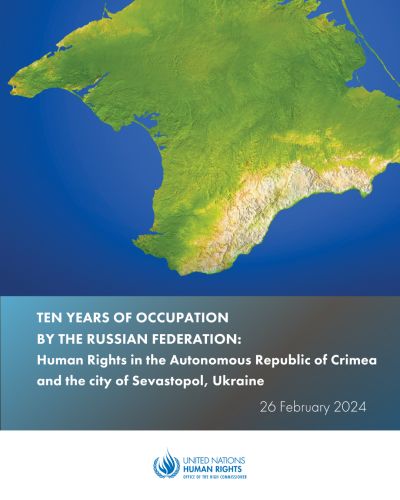Ten Years of Occupation by the Russian Federation: Human Rights in the Autonomous Republic of Crimea and the City of Sevastopol, Ukraine

The illegal 2014 annexation of Crimea by the Russian Federation led to the unlawful imposition of Russian citizenship and law and institutions across all spheres of life. Occupying authorities repressed opposition, perpetrating serious violations of human rights and IHL. These violations have not been effectively investigated.
Russian Federation occupying authorities in Crimea have consistently suppressed freedom of expression, including by members of minority cultures and identities, and severely curtailed the freedom of religion of minority groups, particularly those opposing official narratives, most notably the Mejlis. The space for civil society to operate, criticize or advocate has considerably shrunk. Media outlets have been shut down, disproportionately affecting Crimean Tatar and Ukrainian communities, their rights to freedom of expression and access to information, and to enjoy and maintain their own cultures and identities.
The failure by the Russian Federation to uphold its obligations under IHL as the occupying Power in Crimea creates numerous and complex issues for Ukraine with respect to future re-integration of the peninsula, including the re-issuance of official documents, the classification and implementation of court decisions, and the regularization of expropriated property.
In ten years of reporting on the human rights situation in the peninsula, the disregard of the Russian Federation for its obligations under IHL has inflicted serious and enduring harm on the people of Crimea. A similar pattern is emerging in other parts of Ukraine: eight years after occupying and illegally annexing Crimea, the Russian Federation proceeded to occupy and then illegally annex areas of Donetsk, Luhansk, Kherson, and Zaporizhzhia regions, where OHCHR has documented violations of a similar nature.
HRMMU will continue monitoring and reporting on the human rights situation in Crimea and in other occupied areas of Ukraine, including in Donetsk, Kherson, Luhansk and Zaporizhzhia regions in line with its mandate.




